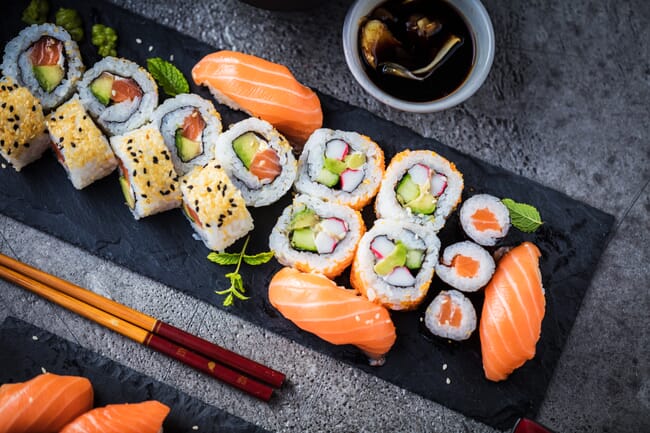
However, in recent years campaigners have been putting pressure on a number of popular restaurant chains to rethink their sourcing policy
In Packham’s call for action, he highlights the environmental and animal welfare issues linked with salmon farming, while campaign groups Feedback and WildFish – who helped to initiative the petition – have “highlighted the hypocrisy of the major restaurant chain for claiming to 'tread softly' as a business, while refusing to discuss its decision to put farmed salmon on its menu.”
“While the chain has increased its plant-based menu options, its menu includes four farmed salmon dishes. As a restaurant which markets itself as a sustainability leader, Wagamama’s response may set a precedent for the place of farmed salmon on hospitality menus across the food service sector,” the campaigners add.
They also highlight the extensive use of forage fish from West Africa to make fishmeal and fish oil used in salmon feeds.
"The research calculates that production of West African fish oil for the Norwegian aquaculture industry is depriving up to 4 million people in the region of fish," they state.
Packham said: “Farmed salmon is an environmental and social disaster. It’s time for Wagamama to step up to their sustainability credentials and take farmed salmon off the menu.”
Rachel Mulrenan, director of WildFish (Scotland), added: “The damage being done by open-net salmon farming to our environment, the health and welfare of wild and farmed fish, and global communities is clear to see. This unsustainable industry has lost its social licence; the sheer number of UK and international chefs and restaurants choosing to remove farmed salmon from their menus is testament to this. If Wagamama is truly committed to ‘an earth positive future’ then it too must commit to taking farmed salmon off its menu.”
A robust response from Wagamama
However, a Wagamama spokesperson has since refuted some of the campaign's key claims - not least regarding the sourcing of salmon that may have consumed marine ingredients from West Africa.
As they explained to The Fish Site: “Sustainability is at the heart of everything we do at Wagamama, including how we source from and work with our suppliers, which is why all our salmon is sustainably sourced from Scottish and Norwegian fisheries that do not use feed from West Africa.
“These fisheries are accredited by GlobalG.A.P., the world’s leading standard for seafood farmed with care. They set strict requirements for responsible seafood farming that require producers to farm with care for fish, the environment and the people on and around the farm.
“We regularly ensure that all our suppliers adhere to our strict sourcing policy, as well as conducting routine audits and site visits to verify compliance, traceability and transparency.
“Our current procurement process means that by the end of 2024 all future Wagamama salmon will be sourced only from Scottish fisheries which are in addition RSPCA accredited.
“At Wagamama we believe in continual improvement and are always looking to expand our sustainability goals. The part we must play as a brand is extremely important and the small decisions we make can create big change and whilst progress takes time, it begins with all of us.”




